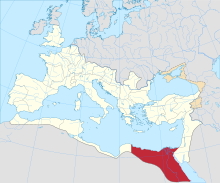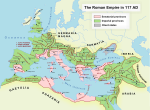อียิปต์สมัยโรมัน
| อียิปต์ของโรมัน ละติน: Aegyptus กรีกคอยนี: Αἴγυπτος Aigýptos | |||||||||||
|---|---|---|---|---|---|---|---|---|---|---|---|
| มณฑลของจักรวรรดิโรมัน | |||||||||||
| 30 ปีก่อน ค.ศ. – ค.ศ. 641 (ถูกยึดครองโดยเซซาเนียนใน ค.ศ. 619–628) | |||||||||||
 มณฑลไอกึปตุสใน ค.ศ. 125 | |||||||||||
| เมืองหลวง | อะเล็กซานเดรีย | ||||||||||
| ประชากร | |||||||||||
• คริสต์ศตวรรษที่ 1 | 4 ถึง 8 ล้านคน[1] | ||||||||||
| ยุคทางประวัติศาสตร์ | สมัยคลาสสิก ปลายสมัยโบราณ | ||||||||||
• พิชิตราชอาณาจักรทอเลมี | 30 ปีก่อน ค.ศ. | ||||||||||
• ก่อตั้งเขตการปกครอง | ค.ศ. 390 | ||||||||||
| ค.ศ. 641 | |||||||||||
| |||||||||||
| ปัจจุบันเป็นส่วนหนึ่งของ | อียิปต์ | ||||||||||
บทความนี้เป็นส่วนหนึ่งของ |
|---|
| ประวัติศาสตร์อียิปต์ |
 |
|
อ้างอิงคริสต์ศักราช "BC" หมายถึง ปีก่อนคริสต์ศักราช |
อียิปต์ (อังกฤษ: Egypt) หรือ ไอกึปตุส (ละติน: Aegyptus, ออกเสียง: [ae̯ˈɡʏptʊs]) หรือ แอกึปโตส (กรีกคอยนี: Αἴγυπτος, อักษรโรมัน: Aígyptos, ออกเสียง [ɛ́ːɡyptos]) เป็นหน่วยการปกครองย่อยของจักรวรรดิโรมัน ซึ่งถูกก่อตั้งขึ้นหลังจากโรมผนวกราชอาณาจักรทอเลมีใน 30 ปีก่อน ค.ศ. จนถึงจักรวรรดิไบแซนไทน์สูญเสียมณฑลอียิปต์จากการพิชิตดินแดนโดยมุสลิมใน ค.ศ. 641 มณฑลแห่งนี้ครอบคลุมพื้นที่ที่ในปัจจุบันคือประเทศอียิปต์เป็นส่วนใหญ่ ยกเว้นคาบสมุทรไซนาย และมีพรมแดนทางทิศตะวันตกติดกับมณฑลกริตาและกิเรนาอิกาและมณฑลยูไดอาทางทิศตะวันออก ซึ่งในเวลาต่อมาก็ติดกับมณฑลอาระเบียเพเทรีย อียิปต์กลายเป็นผู้ผลิตธัญพืชรายใหญ่ให้กับจักรวรรดิโรมัน และมีเศรษฐกิจในเมืองที่มีการพัฒนาสูง ไอกิปตุสเป็นมณฑลที่มั่งคั่งมากที่สุดในมณฑลของโรมัน ทั้งในมณฑลที่อยู่ฝั่งตะวันออก[2][3] และในมณฑลที่อยู่ภายนอกอิตาลี[4] ประชากรของอียิปต์ของโรมันเป็นที่ไม่ทราบแน่ชัด ถึงแม้ว่าจะมีการประมาณประชากรแตกต่างกันไป ตั้งแต่ 4 จนถึง 8 ล้านคนก็ตาม[1] ภายในเมืองอะเล็กซานเดรียซึ่งเป็นเมืองหลวงของมณฑลมีท่าเรือที่ใหญ่ที่สุด และเป็นเมืองที่มีประชากรมากที่สุดเป็นอันดับ 2 ของจักรวรรดิโรมัน
บรรณานุกรม
[แก้]- ↑ 1.0 1.1 Janzen, Mark (2017). "Ancient Egypt Population Estimates: Slaves and Citizens". TheTorah.com. สืบค้นเมื่อ 18 August 2019. อ้างอิงผิดพลาด: ป้ายระบุ
<ref>ไม่สมเหตุสมผล มีนิยามชื่อ "pop" หลายครั้งด้วยเนื้อหาต่างกัน - ↑ Publishing, Britannica Educational (2010-04-01). Ancient Egypt: From Prehistory to the Islamic Conquest (ภาษาอังกฤษ). Britannica Educational Publishing. ISBN 9781615302109.
- ↑ Wickham, Chris (2009-01-29). The Inheritance of Rome: A History of Europe from 400 to 1000 (ภาษาอังกฤษ). Penguin UK. ISBN 9780141908533.
- ↑ Maddison, Angus (2007), Contours of the World Economy, 1–2030 AD: Essays in Macro-Economic History, p. 55, table 1.14, Oxford University Press, ISBN 978-0-19-922721-1
- Alston, Richard. “Philo's In Flaccum: Ethnicity and Social Space in Roman Alexandria”. Greece and Rome. Second Series. Vol. 44. No. 2 (Oct. 1997). p. 166. http://www.jstor.org/stable/643058. Accessed October 27, 2008.
- Angold, Michael. 2001. Byzantium : the bridge from antiquity to the Middle Ages. 1st US Edition. New York : St. Martin's Press
- Bell, Idris H. “Hellenic Culture in Egypt.” The Journal of Egyptian Archaeology, Vol. 8, No. ¾ (Oct., 1922), pp. 139–155.
- Bowman, Alan Keir. 1996. Egypt After the Pharaohs: 332 BC–AD 642; From Alexander to the Arab Conquest. 2nd ed. Berkeley: University of California Press
- Bowman, Alan K. and Dominic Rathbone. “Cities and Administration in Roman Egypt.” The Journal of Roman Studies 82 (1992): 107-127. Database on-line. JSTOR, GALILEO; accessed October 27, 2008
- Chauveau, Michel. 2000. Egypt in the Age of Cleopatra: History and Society under the Ptolemies. Translated by David Lorton. Ithaca: Cornell University Press
- Delia, Diana. "Alexandrian Citizenship During the Roman Principate." Atlanta: Scholars Press, 1991.
- El-Abbadi, M.A.H. “The Gerousia in Roman Egypt.” The Journal of Egyptian Archaeology 50 (Dec., 1964): 164-169. Database on-line. JSTOR, GALILEO; accessed October 27, 2008.
- Ellis, Simon P. 1992. Graeco-Roman Egypt. Shire Egyptology 17, ser. ed. Barbara G. Adams. Aylesbury: Shire Publications Ltd.
- Hill, John E. 2003. "Annotated Translation of the Chapter on the Western Regions according to the Hou Hanshu." 2nd Draft Edition. [1]
- Hill, John E. 2004. The Peoples of the West from the Weilue 魏略 by Yu Huan 魚豢: A Third Century Chinese Account Composed between 239 and 265 CE Draft annotated English translation. [2]
- Hölbl, Günther. 2001. A History of the Ptolemaic Empire. Translated by Tina Saavedra. London: Routledge Ltd.
- Lewis, Naphtali. “Greco-Roman Egypt”: Fact or Fiction?” On Government and Law in Roman Egypt, ed. Ann Ellis Hanson, 138-149. Atlanta: Scholars Press, 1995.
- Lloyd, Alan Brian. 2000. "The Ptolemaic Period (332–30 BC)". In The Oxford History of Ancient Egypt, edited by Ian Shaw. Oxford and New York: Oxford University Press. 395–421
- Peacock, David. 2000. "The Roman Period (30 BC–AD 311)". In The Oxford History of Ancient Egypt, edited by Ian Shaw. Oxford and New York: Oxford University Press. 422–445
- Sherwin-White, A.N. "The Roman Citizenship." Oxford: Clarendon Press, 1973. p. 391.
- Turner, E.G. “Oxyrhynchus and Rome.” Harvard Studies in Classical Philology 79 (1975): 1-24. Database on-line. JSTOR, GALILEO; accessed October 27, 2008.
- Turner, E.G. “Roman Oxyrhynchus.” Journal of Egyptian Archaeology 38 (Dec., 1952): 78-93. Database on-line. JSTOR, GALILEO; accessed October 27, 2008.
ดูเพิ่ม
[แก้]แหล่งข้อมูลอื่น
[แก้]![]() วิกิมีเดียคอมมอนส์มีสื่อเกี่ยวกับ โรมันอียิปต์
วิกิมีเดียคอมมอนส์มีสื่อเกี่ยวกับ โรมันอียิปต์

